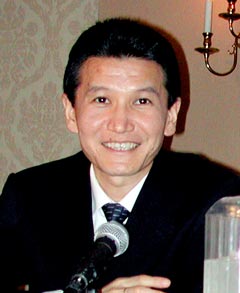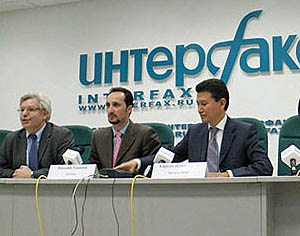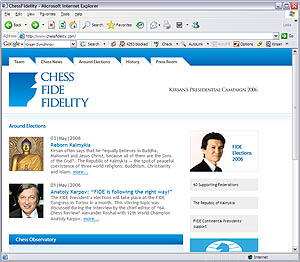 |
 |
 |
 |
 |
 |
 |
 |
 |
 |
 |
 |
 |
 |
 |
 |
 |
 |
 |
 |
 |
 |
 |
|
|
|
|
|
|
|
|
|
|
|
|
|
|
|
|
|
|
|
|
|
|
|
|
|
 |
|
|
|
|
|

|
|
|
|
|
|
|
|
|
At the 2006 Olympiad in Turin, Italy, the General Assembly comprised of FIDE member nations will vote for one of two parties for leadership in the chess body. Kirsan Ilyumzhinov is the incumbent President and will receive stiff opposition from Bessel Kok's "Right Move" ticket.
Campaign politics have begun to gain momentum as barbs have been exchanged between the two parties and a number of interviews have been granted. The Chess Drum's Daaim Shabazz requested an interview with Kirsan Ilyumzhinov and received get the responses that follow in this exclusive interview.
Ilyumzhinov reflected on his tenure as President since 1995 and touched on a number of issues concerning the unification match, Kasparov's future in chess, developing federation and his vision for the future. In the next two months, both parties will be jockeying for position to convince federations around the world that they hold the key to moving the chess agenda forward. Following is the interview transcript:
|
|
|
|
|
|
|
|

|
|
|
|
|
|
|
|
|
|
|
|
|
|
|
|
TCD: It is without a doubt that the Europe still dominates the sport of chess. However, given the rise of such nations such as China, India and Cuba, is it too early to say that we are experiencing a change in the balance of power in the chess world?
Kirsan Ilyumzhinov: I try not to speculate. True, China, India and some other countries are showing great promise but it takes a very brave and perhaps foolhardy person to write off Europe and Russia.
TCD: There are many talented players around the world who struggle to get invitations and recognition. For example, most did not know of Robert Gwaze (Zimbabwe) until he went 9-0 on board #1 in the 2002 Olympiad in Bled. In addition, South Africa's Watu Kobese and Zambia's Amon Simutowe have been top players in Africa for a long time, both pursuing the GM title. In the U.S. I personally know talented U.S. players such as Emory Tate and Stephen Muhammad who are in the same situation. In the Caribbean much of the talent has been untapped. What is your thought of a Grandmaster Developmental Institute to provide financial assistance and training for those identified (by an application process) with the potential to become Grandmasters? Please elaborate.
Kirsan Ilyumzhinov: It's an interesting idea. But one needs a balance between a natural as opposed to a nurtured grandmaster. If there is a concrete proposal, FIDE might look at it.
TCD: The granting of automatic titles (as opposed to three norms) in zonal events have been criticized and aimed at zones of developing regions. What is your view on getting automatic titles in zonal events and do such practices dilute the prestige of chess titles?
Kirsan Ilyumzhinov: This practice is centred on the performance of players who excel during these events. Having set the criteria for the award of these chess titles the prestige will therefore remain intact. This contribution to chess activities in the developing regions is duly appreciated.
By the way, this automatic system of awarding titles in zonal events was introduced before my administration - before Campomanes, before Olafsson, before Euwe, during Rogard. During the Rogard years (1949 to 1970), FIDE was made up mainly of European nations - were they considered developing regions? They were the first and main benefactors of the system. FIDE membership doubled only during the Campo years. I repeat - most of the critics of this system were benefactors of the system which was already in place since the 1960's. Should we agree that Rogard was wrong, Olafsson was lazy to do anything about the mistake, and Euwe was blind? Due to the expansion of FIDE membership during the Campo tenure, the system flourished but I am to blame for diluting the prestige of these titles. I've also heard about the rating system. We have expert committees and these members are mainly from the developed world. FIDE does not interfere with their expert recommendations.
TCD: What has been one of the main accomplishments of FIDE in the last ten years?
Kirsan Ilyumzhinov: The dynamic nature of chess administration has required FIDE to evolve in conformity with prevailing situations. This we have done quite effectively. In the last ten years stability and unity have undoubtedly been the main accomplishments of FIDE.
TCD: What is your 5-year marketing plan to popularize chess worldwide?
Kirsan Ilyumzhinov: The Topalov-Kramnik unification match offers the chess community an excellent opportunity to start the next FIVE years of FIDE with renewed optimism. We must proceed to popularize chess much more to attract more sponsors. Opportunities such as the Internet and mobile technology are developing a very rapid pace today. As I have previously stated, getting closer to each Federation and strengthening our school programmes are paramount. Improvement of our technical and financial programs for less developed countries and provision of marketing and advertising programs to help attract sponsors will be enhanced.
TCD: Thank you for taking time out of your busy schedule to address the Drum audience!
Interview posted 3 May 2006
(Other interviews available here)
|
|
|
|
|
|
|
|
|
|
|
|
The Chess Drum: Mr. Ilyumzhinov, tell us about your tenure as FIDE President and how you feel you have improved the conditions for chess?
Kirsan Ilyumzhinov: My tenure has been eventful. I have had to juggle my chess duties with my other duties. Fortunately, I have had very capable people on the Presidential Board and the Continental Boards and various committees who have given me very strong support. The new World Championship format proved popular and allowed many more players to participate at the highest level. The Women's Championships were completed successfully though not without difficulties. In themselves, these were achievements, some might say improvement. I leave it for history to judge. The building of Chess City in Kalmykia, which is open to all players, remains a source of great pride.
TCD: If you are re-elected as FIDE President, how will this term be any different from the first 10 years?
Kirsan Ilyumzhinov: Hopefully, the unified World Championship will usher in a period of stability and allow FIDE to continue to progress without the bickering that had been a characteristic of some years in the past.
TCD: After great anticipation and discussion about unification, you have announced the Topalov-Kramnik unification match. Both players have agreed to terms, but many skeptics doubt that this will happen. If this match is a success, it will have settled more than a decade of turmoil. Looking back on those formative years, were there things that could have been done to accelerate the process?
Kirsan Ilyumzhinov: Sadly, there are always sceptics. Let's just wait and see.
|
|
|
|
|
|
|
|
|
|

|
|
|
|
|
|
|
|
|
TCD: In an interesting 2002 photo which showed you seated with Bessel Kok, Vladimir Kramnik, Garry Kasparov and Anatoly Karpov you are shown deliberating in what would lead to the famous Prague Agreement. That plan did not turn out as planned, but since that time you have been successful in arranging a unification match. With Kasparov having retired from chess, will he play a role in the future of chess or have you decided to build in a post-Kasparov era?
Kirsan Ilyumzhinov: It's a pity when a great champion "retires". Hopefully, players like Kasparov and Karpov will continue to play some role, as ambassadors of our beloved game, as role models for aspiring chess players all over the world. Of course, new players will vie for their mantles and naturally some other player may dominate the stage. I don't know that's something that can be "engineered", if that's what you meant.
TCD: In the past, you have prided yourself on making chess more accessible to developing regions by holding major tournaments in each continent. In an interview conducted by Geoffrey Borg and Ali Nihat Yizici, you stated, "We must get closer to each Federation, we have to strengthen our school activities, improve our technical and financial programs for less developed countries, draft marketing and advertising programs to attract sponsors." What are your specific plans for developing regions, particularly those in the Africa and the Caribbean?
Kirsan Ilyumzhinov: I still hold that view. However, different regions advance at different paces. Where particular countries or regions need help they can work more closely with their Continental Presidents in organising events, training (players, organisers and arbiters). CACDEC also has resources for such development. As part of our commitment we have allowed representatives from various regions to prepare programmes tailor-made for their situations.
|
|
|
|
|
|
|
|
|
|

|
|
|
|
|
|
|
|
|
|
|
|
|
|
|
|
|
|
 |
|
 |
|
|
|
|
|
|
|
|
|
|
|
|
|
|
|
|
|
|
|
|
|
|
|
|
|
 |
|